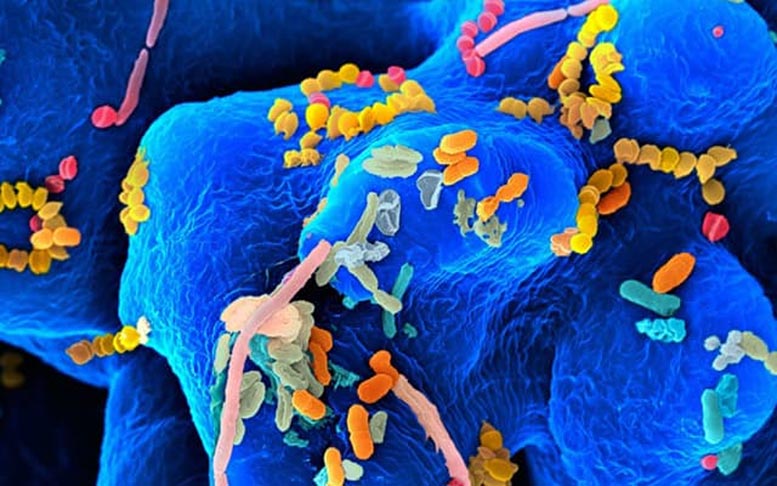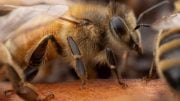
Greater diversity of gut microbes may be associated with greater wisdom or vice versa; similarly less diversity might mean higher likelihood of being lonely. Credit: UC San Diego Health Sciences
It may take guts — or more precisely, a diverse gut microbiome — to achieve wisdom and fend off loneliness. Or perhaps it’s the other way around, report UC San Diego researchers.
The evolving science of wisdom rests on the idea that wisdom’s defined traits correspond to distinct regions of the brain, and that greater wisdom translates into greater happiness and life satisfaction while being less wise results in opposite, negative consequences.
Scientists have found in multiple studies that persons deemed to be wiser are less prone to feel lonely while those who are lonelier also tend to be less wise. In a new study, published in the March 25, 2021 issue of the journal Frontiers in Psychiatry, researchers at University of California San Diego School of Medicine take the connection between wisdom, loneliness and biology further, reporting that wisdom and loneliness appear to influence — and/or be influenced by — microbial diversity of the gut.
The human gut microbiota is comprised of trillions of microbes — bacteria, viruses, fungi — that reside within the digestive tract. Researchers have known for a while about the “gut-brain axis,” which is a complex network that links intestinal function to the emotional and cognitive centers of the brain.
This two-way communication system is regulated by neural activity, hormones, and the immune system; alterations can result in disruptions to stress response and behaviors, said the authors, from emotional arousal to higher-order cognitive abilities, such as decision-making.
Past studies have associated gut microbiota with mental health disorders including depression, bipolar disorder and schizophrenia, as well as personality and psychological traits regarded as key, biologically based components of wisdom. Recent research has connected the gut microbiome to social behavior, including findings that people with larger social networks tend to have more diverse gut microbiotas.
The new Frontiers in Psychiatry study involved 187 participants, ages 28 to 97, who completed validated self-report-based measures of loneliness, wisdom, compassion, social support and social engagement. The gut microbiota was analyzed using fecal samples. Microbial gut diversity was measured in two ways: alpha-diversity, referring to the ecological richness of microbial species within each individual and beta-diversity, referring to the differences in the microbial community composition between individuals.
“We found that lower levels of loneliness and higher levels of wisdom, compassion, social support, and engagement were associated with greater phylogenetic richness and diversity of the gut microbiome,” said first author Tanya T. Nguyen, PhD, assistant professor of psychiatry at UC San Diego School of Medicine.
The authors said that the mechanisms that may link loneliness, compassion, and wisdom with gut microbial diversity are not known, but observed that reduced microbial diversity typically represents worse physical and mental health, and is associated with a variety of diseases, including obesity, inflammatory bowel disease and major depressive disorder.
A more diverse gut microbiota may be less susceptible to invasion by outside pathogens, which could contribute to and help promote better resilience and stability of the community.
“It is possible that loneliness may result in decreased stability of the gut microbiome and, consequently, reduced resistance and resilience to stress-related disruptions, leading to downstream physiological effects, such as systemic inflammation,” the authors wrote.
“Bacterial communities with low alpha-diversity may not manifest overt disease, but they may be less than optimal for preventing disease. Thus, lonely people may be more susceptible to developing different diseases.”
The relationship between loneliness and microbial diversity was particularly strong in older adults, suggesting that older adults may be especially vulnerable to health-related consequences of loneliness, which is consistent with prior research.
Conversely, the researchers said that social support, compassion, and wisdom might confer protection against loneliness-related instability of the gut microbiome. Healthy, diverse gut microflora may buffer the negative effects of chronic stress or help shape social behaviors that promote either wisdom or loneliness. They noted that animal studies suggest that gut microbiota may influence social behaviors and interactions, though the hypothesis has not been tested in humans.
The complexity of the topic and study limitations, such as the absence of data about individuals’ social networks, diet, and degree of objective social isolation versus subjective reports of loneliness, argue for larger, longer studies, wrote the authors.
“Loneliness may lead to changes in the gut microbiome or, reciprocally, alterations of the gut milieu may predispose an individual to become lonely,” said Dilip V. Jeste, MD, Distinguished Professor of Psychiatry and Neurosciences at UC San Diego School of Medicine and senior author of the paper. “We need to investigate much more thoroughly to better understand the phenomenon of the gut-brain axis.”
Reference: “Association of Loneliness and Wisdom With Gut Microbial Diversity and Composition: An Exploratory Study” by Tanya T. Nguyen, Xinlian Zhang, Tsung-Chin Wu, Jinyuan Liu, Collin Le, Xin M. Tu, Rob Knight and Dilip V. Jeste, 25 March 2021, Frontiers in Psychiatry.
DOI: 10.3389/fpsyt.2021.648475
Co-authors include: Xinlian Zhang, Tsung-Chin Wu, Jinyuan Liu, Collin Le, Xin M. Tu and Rob Knight, all at UC San Diego.
Funding for this research came, in part, from the National Institute of Mental Health (grants K23MH118435, T32MH019934 AND R01MH094151), the UC San Diego Center for Health Aging and the UC San Diego Center for Microbiome Innovation.









I can tell you this. Reading teaches you a multitude of topics. Some are more immediately important than other things but they all make your mind more interesting a companion. I live alone and much prefer to do so. I can read, ride, think, entertain myself with my own thoughts or reach out to the great writers of our time and the past as well. How could anyone be lonely with all that good material available for consideration? If my microbiota wishes to come along for the ride, it is fine with me.
Trace amounts of glyphosphate/patented bactericide will always slew the populations in the gut leading to poorer uptake of b12 and other essential nutrients.
I wish they would say how to diversify it. Would be the most helpful thing..ive had stomach issues for years am only 55 and seems like those issues coincide with less memory retention
Do stay far from western diet and mix up your food and include healthy oils and vegetables and fruit and yogurts and so forth.
any connection between oral antibiotic therapies, which can be a major influence on decreasing the amount of micro flora in the gut and fluctuations in mood (loneliness)?
I completely agree with Bonnie.
Almost 70, living alone and wouldn’t give it up.
Speaking of gut micro flora. I am drinking kefir daily, alternate with yogurt.
Kefir has variety of good bacteria and beneficial yeast.
Yogurt has only bacteria.
Not that sugary staff from store. Making my own.
This Cov19 pandemic challenges some of your statements.
I think there may be some mixed correlation & causation going on, since as the saying goes, “it’s lonely at the top.” That’s not to imply superiority but rather that a lot of time with others is spent listening since it’s still difficult to work one’s thoughts into a relatable context.
Also, there is a big difference between loneliness in the heart of civilization and loneliness in rural environments. The former is further clouded by slight jealousy by seeing others and presents itself as longing. The latter is more like Paul Bowle’s Bapteme de la Solitude and eventually even loneliness is nowhere to be found.
Loneliness is certainly influenced by much so that a link with our gut makes sense. My diverse diet perhaps creates a reality that makes my life interesting enough without a feeling of disconnect from others. So I’ll have more dark chocolate with cinnamon tea.